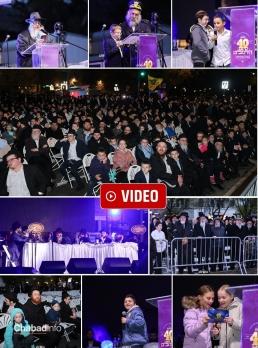True Love Is Worth Fighting For
According to the teachings of Chassidus, all of these developments were to be seen as ever greater expressions of Hashem’s super-love for His beloved Jewish people, and as ever greater opportunities for them to reciprocate by revealing and expressing their super-love for Him in mature fashion • By Rabbi Zvi Homnick, Beis Moshiach Magazine • Full Article
Rabbi Zvi Homnick, Beis Moshiach
The young man entered the bank on the ground floor of the Midtown Manhattan hotel, during lunch hour when the bank was at its busiest. Looking around, he spotted a well dressed older man standing in line. Striding purposefully, he approached the man, fell to his knees, grabbed his hand and started kissing it. Looking up, he passionately exclaimed, “Dad, I love you so much. I know I said and did some things that I shouldn’t have, but I’m really sorry and I’m begging your forgiveness. Please, let me come back home.”
The older man smiled down at him and said, “Yes, son, I love you too and I forgive you. I think we both know how much your mother will be thrilled to see you. Just wait until I finish up here and we will head straight home.”
The people in the bank began to cheer as the older man spread his arms wide for a hug, but instead of reacting happily the young man fainted. The security guard came over and began to try to revive him. When he finally came to, he tried to get up and run but the security guard held him back asking, “What just happened here?”
The young man stammered an explanation that he was taking a sales course here in the hotel, and part of the training was to be able to handle rejection. Their lunch break assignment was to approach a stranger with a request that would surely be rejected in an embarrassing public way, and this man was a complete stranger to him.
The guard looked to the older man who said, “I figured that’s what it was. I wanted him to know that love is not a sales pitch. Don’t go asking for it if you’re not ready to hear a yes.”
***
The Rebbe Rayatz cites numerous differences between the approach of the Alter Rebbe and the other disciples of the Maggid. Some of the differences include: ChaBaD (intellect) as opposed to ChaGaS (emotions); reaching out to Torah scholars of the opposing camp as opposed to just focusing on raising a new generation of Chassidim from childhood; and each person doing the work himself as opposed to relying on the Rebbe/Tzaddik.
He also refers to differences between the Alter Rebbe and the Baal Shem Tov and Maggid such as: pnimi (internalizing the light of Chassidus) as opposed to makif (being overtaken by the light of Chassidus); making baalei teshuva as opposed to focusing only on creating Tzaddikim; and lengthy detailed explanations as opposed to short bursts of inspiration. Despite these differences, the Rebbe Rayatz makes it clear that the Alter Rebbe is a direct continuation of his predecessors, and the Baal Shem Tov himself foresaw this “new soul” coming into the world to take their teachings to the next level, and he was groomed specifically to carry out this mission.
To appreciate the underlying thread that runs through these differences, we need to understand the nature of the challenge facing the next generation of Chassidus. The world was undergoing change at a rapid pace. The Age of Enlightenment in Europe was progressing full steam ahead, with the entire continent in a state of intellectual, social and political upheaval. The American Revolution was heating up (the Maggid passed away at the end of 1772), which would be followed not long after by the French Revolution. More opportunities for Jews to assimilate were opening up in more parts of the world, even as the gentile world was moving away from traditional religious beliefs.
According to the teachings of Chassidus, as explained in earlier installments, all of these developments were to be seen as ever greater expressions of Hashem’s super-love for His beloved Jewish people, and as ever greater opportunities for them to reciprocate by revealing and expressing their super-love for Him in mature fashion. The question was, how?
As the Alter Rebbe explains in Tanya, the main battleground between the G-dly soul (imbued with this instinctive all-consuming love) and the animal soul (imbued with the competing self-love) is in the heart. Framed in other words, the main job in galus is to conquer the land of the seven nations (the seven self-centered emotional attributes of the animal soul) and turn it into Eretz Yisrael (emotional attributes that express the true desire of a Jew to express his super-love for Hashem). It is not enough for the G-dly soul to overpower the selfishness of the animal soul with the selflessness of the G-dly soul, it has to change the animal emotions into passionate channels of the super-love of the neshama. As we explained, a mature relationship based on that love is one where my entire self is invested and not just manifest when I forget about myself and focus on the other.
The great light the first Patriarchs of Chassidus brought into the world did not address this directly, since they revealed the higher soul powers through the light of Chassidus with such intensity (makif) that the animal soul was overpowered. This is not just some theoretical concept from the storybooks, but something that most of us have experienced and witnessed in one way or another.
For those of us who had the privilege of being in the presence of the Rebbe, to pass by for a dollar, lekach, a kuntrus; all the more so at the singing of Napoleon’s march at the end of Yom Kippur or Hakafos on Simchas Torah; or the impassioned singing of Yechi when the Rebbe was on the porch; we lived it ourselves and saw it in others around us. But even in everyday life, we have all lived through, and seen others who appear to us as not very refined people live through, moments of spiritual highs whether during happy events or challenging events or even just reaching out to a fellow Jew, when all of the detritus of the animal soul just seemed to fade away and we/they were totally infused with the glow of that super-love. All without any inner battle. The challenge is and always was how to channel that power into winning the daily battle of changing myself from the inside out.
In the third generation of Chassidus, the “honeymoon” period of the Baal Shem Tov and the “first year” period of the Maggid came to an end. Now, in a spiritually darker world, the party was over and the battle for revealing the true Oneness of Hashem would begin. The light they brought into the world had to be channeled toward the personal/global war of conquering the “seven nations,” the natural desires and inclinations of the animal soul, and redirecting their passions to transcend self as separate from Hashem and reinventing the self as part of Hashem’s Oneness. The Alter Rebbe, as the preordained successor to lead the Jewish people into this battle, with the ultimate goal of transforming the world into a “dwelling place for Hashem,” had to come up with a system that was different from but loyal to his predecessors, even as his fellow disciples chose other paths.
*
The magazine can be obtained in stores around Crown Heights. To purchase a subscription, please go to: bmoshiach.org
79
Join ChabadInfo's News Roundup and alerts for the HOTTEST Chabad news and updates!










































